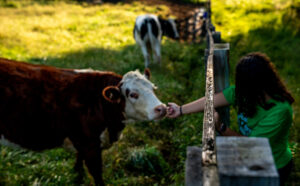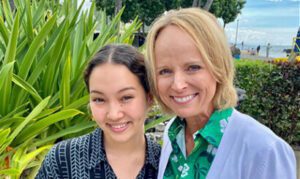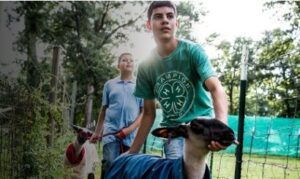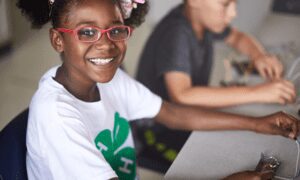I caught up with Avery to discuss why it’s important to find your passion and create more opportunities for diversity in agriculture.
What was life like growing up on your family’s farm?
Avery Williamson (AW): I grew up on my family’s farm in Milan, Tennessee. It was right down the street from where my grandpa and great-grandpa’s farms used to be. I spent a lot of time outside as a kid and started helping my dad around the farm when I was six years old. My dad was a truck driver, so when he was away, he would leave me in charge and give me responsibilities on the farm, including feeding and taking care of our cows. It wasn’t easy at times because I’d usually have to work on the farm before school or afterwards when most of my friends were out having fun.
After I went to college and entered the NFL, my dad continued to work on the farm after retiring. During my second year in the NFL, I learned that one of my teammates had a farm. So that inspired me to invest in our family farm. I purchased new equipment, more cows, and the rest is history. I love it. Unfortunately, I don’t get to go back as much as I want to right now, but it’s something I really love. I’m passionate about farming, and it’s what I want to do when I retire. I think managing a farm is something that not many people think a Black athlete would be doing.
How did your experience in agriculture shape who you are today?
AW: My dad always said that the hard work I did on the farm made me tough for football. It instilled a strong work ethic and sense of responsibility at a young age. When I was in 5th grade, I knew I wanted to get into football, so to work out, I built a track in our hay fields to pull a car tire back and forth every day, rain or shine, in between school and my farm chores. I eventually worked my way up to a tractor tire before I went to college.
In elementary school, I learned a lot about agriculture and taking care of cows through Tennessee 4‑H. 4‑H supported my passion and interest in farming, building skills that helped with our family farm and in business which I still use to this day.
Why do you think it’s important to uplift stories like yours or those of other Black farmers?
AW: It’s so cool for kids to hear these stories because it could inspire them to explore careers or interests in agriculture. The world runs on agriculture—from the clothes we wear to the food we eat. We’ll rely on young people to bring fresh ideas and talent to the agriculture industry in the future. That means making sure all voices are heard. As an athlete, I have a great platform. So hopefully telling my story and stories of my family will inspire others.
What are some of the challenges facing Black farmers today?
AW: For my family, even growing up, we continue to face racism. Others would see the hard work we put into our farm, the resources we have, and think we aren’t deserving of them because we are Black. A year ago, someone opened the gate to our farm, and nearly all of our cows got out. We experience these kinds of incidents to this day. But we never let it deter us from what we love to do. We’re proud that our family has always had our own land, all the way back to my great-grandpa.
In what ways are you inspiring young people to find their passion, as you found yours, whether in agriculture, sports, or other interests?
AW: I try to lead by example and help young people to see their own potential by continuing to show my work ethic and my passion. I’ve stayed consistent. I tell kids all the time that even when you are successful in something, you have to keep pushing. Continue to motivate yourself through the good and bad moments.
So, what brought you back to 4‑H, and why are you partnering with the organization?
AW: My 4‑H and agriculture experiences helped shape who I am today. I am so much more than a football player because of it. So I wanted people to see that side of me and to pay it forward. Through my partnership with 4‑H, I’ve been able to share what a day in the life of a farmer is like by inviting aspiring farmer, Ohio 4‑H’er Joyona Helsel to my farm. We had so much fun. We rode in my tractor, baled hay, and picked fresh vegetables from the garden. Joyona even tried a beet for the first time. I love to share these experiences with young people and show them that there’s more to farming than they might think. And I hope to continue to open up my farm to more kids. I want to use my platform to give kids opportunities and experiences that could inspire an interest in agriculture.
What are some other ways we can continue providing young people with meaningful experiences that will impact and change the course of their future?
AW: Hands-on experiences are key. For example, it’s essential to get kids out on the farm when it comes to agriculture. Let them experience it. Every kid learns differently. Along with traditional classroom learning, kids need the opportunity to see it, live it, and experience firsthand what interests them. It can be life changing.
What advice would you give to a young person who has a passion for agriculture and wants to find their purpose in the field?
AW: Don’t give up on what you love to do. There are a lot of opportunities, especially for Black farmers. For any person of color, you can be successful in agriculture.

This interview is a part of a series of blogs supporting 4‑H’s Community Impact program emphasizing Diversity, Equity, Inclusion – an effort sponsored by Nationwide®
Nationwide, the Nationwide N and Eagle and Nationwide is on your side are service marks of Nationwide Mutual Insurance Company. © 2021 Nationwide
















